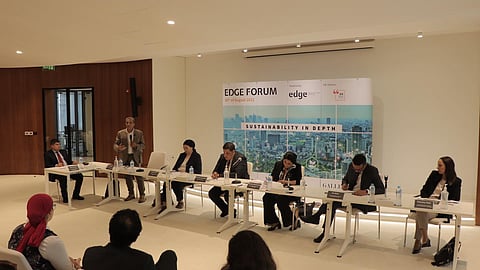Edge Innovation Center Seminar Explores Sustainability & Future Plans
Former Egyptian Environment Minister Dr Khaled Fahmy has disclosed several challenges facing the Egyptian government, which is planned to host the climate summit in Sharm El-Sheikh next November.
He additionally pointed out the international rift caused by the Russian-Ukrainian conflict and the global economic crisis, which poses a threat to Egypt's summit.
This was revealed during a forum titled "Sustainability and Future Plans" hosted by Edge Innovation Center, an affiliate of Raya Smart Building Company, the real estate arm of Raya Holding.
The forum was moderated by Saber Osman, Chairman of the Board of Trustees of “Planetary Climate” initiative for sustainable development and Former Coordinator of the United Nations Framework Convention for climate change.
Egypt Considers Cooperation With Slovenia in Renewable Energy Sector
He highlighted Egyptian government's efforts in hosting the COP 27, how the private sector contributes to collaborating with the government to make the summit a success and achieve sustainability in various fields, and the role of civil society in the issue of climate change.
Dr Fahmy stated that climate change is a cross-border, as well as an economic and political issue that needs extensive discussions in order to establish a compromise formula, stressing that there are high expectations for the Sharm el-Sheikh summit.
The event is significant for Egypt, the host country, as well as the anticipated benefits for developing countries, notably African ones.
Fahmy emphasized that while governments throughout the world have pledged to reduce carbon emissions, few have committed to establishing executive strategies to combat this harmful situation, stressing that just 60% of the hoped-for effort has been met.
Meanwhile, we haven’t yet reached the dangerous stage of increase in the Earth's temperature by 1.5 degrees Celsius, emphasizing that climate change containment and adaptation ranks first in terms of effect and likelihood of happening during the next 10 years.
“The challenge for developing nations in implementing clean growth policies is the lack of adequate funding, which makes it difficult for most of these countries to secure international finance in the form of loans. This calls for new financing policies to address financial challenge."
Fahmy warned against rich nations attempting to avoid their climate change financial obligations, stating that majority of them indicated that their involvement in financing sustainability challenges would be 25% of government fund.
Maysoun Ali, Commercial International Bank's Head of Sustainability, acknowledged that the bank's goal is to achieve sustainable development in Egypt and to accelerate the transition to a green economy in order to meet future risks.
"To achieve Egypt's 2030 vision, the bank intends to integrate finance solutions with environmental and social criteria, as well as government ideals,” Maysoun added.
“The bank adopted sustainability policies and encouraged green investments, which resulted in a complete qualitative transformation within the bank.”
"CIB offered many green financing programs aimed at helping clients fund industrial pollution control, new and renewable energy, agricultural projects, and related services and sectors, as well as the green economy financing program,” she added.
Yasmine Sakr, Director of Social Responsibility and Sustainability at Raya, said that achieving sustainable development is a collaborative responsibility of bodies, governments, and individuals, and no one entity can do so alone.
“We are one of the organizations that began incorporating sustainability standards into their projects, and Edge Center and Galleria Mall are two examples of buildings that we have equipped to be ecologically friendly and to meet sustainability goals."
"In addition to the afforestation initiatives that we execute, we have various industries in which we attempt to apply sustainability, such as automotive and electronic payment,” Sakr added.


